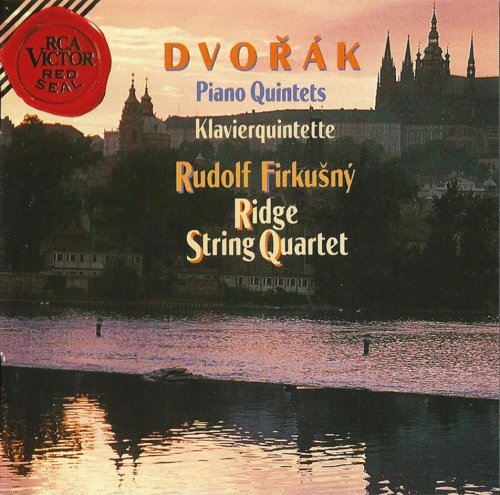
Rudolf Firkušný, Ridge String Quartet - Dvořák: Piano Quintets (1992) CD-Rip
BAND/ARTIST: Rudolf Firkušný, Ridge String Quartet
- Title: Dvořák: Piano Quintets
- Year Of Release: 1992
- Label: RCA Red Seal
- Genre: Classical
- Quality: FLAC (image+.cue,log,scans)
- Total Time: 01:06:12
- Total Size: 317 Mb
- WebSite: Album Preview
Tracklist:
01. Piano Quintet, Op.81: Allegro ma non tanto [0:13:56.67]
02. Piano Quintet, Op.81: Dumka: Andante con moto [0:14:11.18]
03. Piano Quintet, Op.81: Scherzo(Furiant): Molto vivace [0:04:10.00]
04. Piano Quintet, Op.81: Finale: Allegro [0:07:35.12]
05. Piano Quintet Op.5: Allegro ma non troppo [0:08:15.55]
06. Piano Quintet Op.5: Andante sostenuto [0:09:50.48]
07. Piano Quintet Op.5: Finale: Allegro con brio [0:08:28.25]
Performers:
Rudolf Firkušný - piano
Ridge String Quartet
01. Piano Quintet, Op.81: Allegro ma non tanto [0:13:56.67]
02. Piano Quintet, Op.81: Dumka: Andante con moto [0:14:11.18]
03. Piano Quintet, Op.81: Scherzo(Furiant): Molto vivace [0:04:10.00]
04. Piano Quintet, Op.81: Finale: Allegro [0:07:35.12]
05. Piano Quintet Op.5: Allegro ma non troppo [0:08:15.55]
06. Piano Quintet Op.5: Andante sostenuto [0:09:50.48]
07. Piano Quintet Op.5: Finale: Allegro con brio [0:08:28.25]
Performers:
Rudolf Firkušný - piano
Ridge String Quartet
Dvorak was only 30 when writing his first A major Piano Quintet, given its premiere in Prague in 1872. Dissatisfied, even with his attempted revision some 15 years later, he chose not to publish it but to take up the challenge anew in the now universally loved A major Quintet (Op. 81), completed in the early autumn of 1887. How good, all the same, that the earlier work eventually (in 1922) found rescuers, and that both quintets can now be compared and enjoyed on CD.
The latest version comes from Rudolf Firkusny (long recognized as ''the world's foremost exponent of Czech music'') and America's youthful Ridge Quartet, and what warm and characterful playing it is too. Their approach to the opening movement of the earlier work is more affirmative than that of Richter and the Borodins, on Philips, as if to stress the composer's respect for Brahms rather than to pre-echo the Bohemian lyrical charmer to come, as the Russians do. In the Andante sostenuto their timing is much closer to the printed score's suggested 9'50'' than the more leisurely Russians, and this somewhat discursive movement surely benefits from a little extra flow.
In the maturer work the Russians emerge as the more mercurial, and the newcomers as the more stable, of the two teams. The first movement's unpredictable mood changes are conveyed without such sharp fluctuations of tempo, and I certainly prefer the latter's less hurried response to the C sharp minor second subject so as to allow it to sing. The Dumka is most beautifully timed and shaded, again (like the B28 slow movement) benefiting from a slightly faster flow... [T]he finale in its turn is full of local colour, particularly its reel-like second subject. Whereas the Russians were somewhat backwardly recorded at a live concert during the Prague Spring Festival ten years ago, the newcomers emerge more full-bodied and forward. -- Joan Chissell
The latest version comes from Rudolf Firkusny (long recognized as ''the world's foremost exponent of Czech music'') and America's youthful Ridge Quartet, and what warm and characterful playing it is too. Their approach to the opening movement of the earlier work is more affirmative than that of Richter and the Borodins, on Philips, as if to stress the composer's respect for Brahms rather than to pre-echo the Bohemian lyrical charmer to come, as the Russians do. In the Andante sostenuto their timing is much closer to the printed score's suggested 9'50'' than the more leisurely Russians, and this somewhat discursive movement surely benefits from a little extra flow.
In the maturer work the Russians emerge as the more mercurial, and the newcomers as the more stable, of the two teams. The first movement's unpredictable mood changes are conveyed without such sharp fluctuations of tempo, and I certainly prefer the latter's less hurried response to the C sharp minor second subject so as to allow it to sing. The Dumka is most beautifully timed and shaded, again (like the B28 slow movement) benefiting from a slightly faster flow... [T]he finale in its turn is full of local colour, particularly its reel-like second subject. Whereas the Russians were somewhat backwardly recorded at a live concert during the Prague Spring Festival ten years ago, the newcomers emerge more full-bodied and forward. -- Joan Chissell
DOWNLOAD FROM ISRA.CLOUD
Rudolf Firkušný Ridge String Quartet Dvořák Piano Quintets 92 1101.rar - 317.7 MB
Rudolf Firkušný Ridge String Quartet Dvořák Piano Quintets 92 1101.rar - 317.7 MB
Classical | FLAC / APE | CD-Rip
As a ISRA.CLOUD's PREMIUM member you will have the following benefits:
- Unlimited high speed downloads
- Download directly without waiting time
- Unlimited parallel downloads
- Support for download accelerators
- No advertising
- Resume broken downloads


